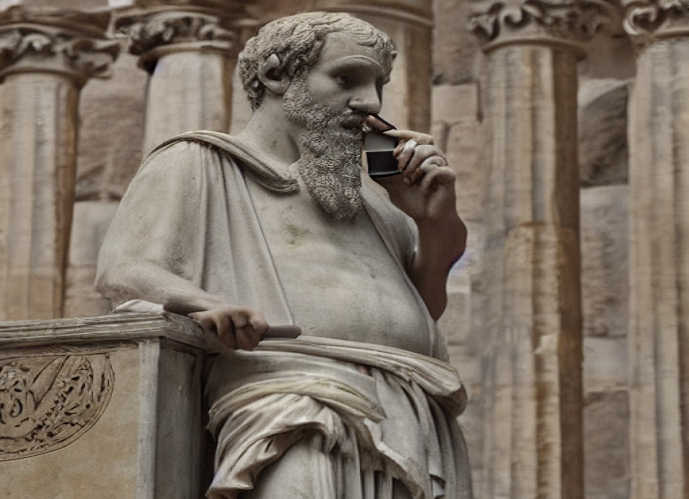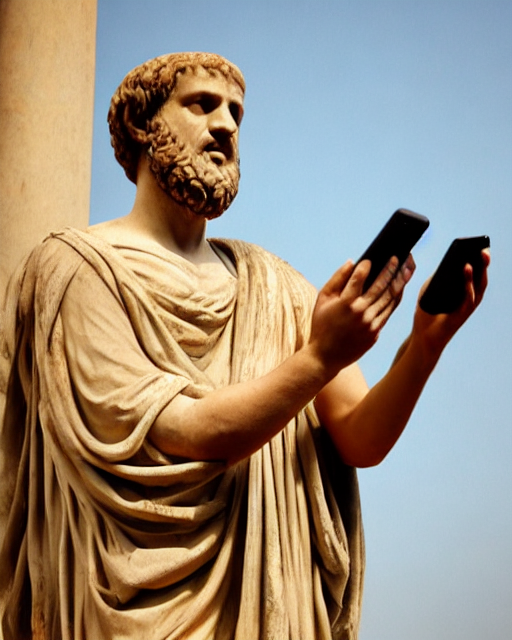How Aristotle's Wisdom Can Enhance Our Communication Skills Today
Written on
Chapter 1: The Communication Crisis
In recent times, public speaking has emerged as a potential antidote to the isolation fostered by social media.

The South Korean government is currently offering $500 monthly to encourage young people to venture outside their homes. According to Matthew Loh from Insider, the Ministry of Family estimates that over 300,000 individuals are living in isolation, avoiding work, school, and social interactions for extended periods. This phenomenon is mirrored in Japan, where a term—hikikomori—has been coined for those leading similar lifestyles. The Japanese Health Ministry estimates that more than 500,000 individuals exist in this state.
Both nations highlight a common trend: individuals are increasingly engaging with screens rather than with real people. Although the West lacks a specific term for this behavior, it is prevalent. Text messaging has replaced phone conversations, and remote work diminishes the need for in-person interactions. Social media has also transformed the concept of friendship.
In an enlightening discussion on the AOM Podcast, author John Bowe recounts the story of a reclusive cousin who, after spending years in his parents' basement, married at the age of fifty-nine. Curious about his cousin's transformation, Bowe asked directly about the change. Surprisingly, the answer did not involve therapy; rather, he joined a public speaking organization called Toastmasters.
This revelation led Bowe to reflect on Aristotle and a profound insight: despite our advanced communication technology, we often struggle to connect meaningfully.
Section 1.1: The Superiority of Speech
Bowe was inspired by his cousin's journey and decided to join Toastmasters himself, delving into its origins. The organization was initially founded to assist agricultural workers transitioning to urban life, who needed to converse with strangers. Ralph Smedley, the founder, believed that without effective communication, individuals remained isolated within their own thoughts.
Interestingly, Aristotle shared this belief centuries ago in his work "Rhetoric," emphasizing the importance of speaking as a foundational skill for Greek society. Similarly, the Romans had a phrase that translates to "to die" as leaving the company of others. So, what happens when we prioritize text messaging over face-to-face conversations?
Research by Amit Kumar and Nicholas Epley in the Harvard Business Review indicates that this shift results in a significant reduction in meaningful connections. Psychotherapist Maggie Mulqueen, in an interview with NBC, elaborates that while texting generates more interactions, it compromises their quality, ultimately harming relationships. She emphasizes that genuine dialogue fosters human connection, which is often absent in text exchanges.
Psychologist Jean Twenge echoes this sentiment in her NPR interview, revealing that the time teenagers spent with friends remained constant from 1976 to 2009, only to dramatically decline afterward—the same year social media gained traction. Since 2010, anxiety, depression, and loneliness have surged, alongside increased self-harm rates.
In light of these findings, it’s clear that the hikikomori phenomenon is not isolated. Bowe believes that Aristotle's teachings and the Toastmasters club offer a simpler remedy than traditional therapy.
Chapter 2: The Power of Rhetoric

Bowe describes his Toastmasters experience as transformative. Initially uncomfortable with public speaking, he now teaches others the craft, attributing his growth to his exploration of Aristotle's work and active participation in the club. He learned that effective communication begins with focusing less on oneself—often a common barrier for many speakers.
The key to a successful speech lies in understanding the audience's needs, which diminishes self-consciousness. Preparation is also crucial to avoid rambling and ensure that the message resonates with listeners. Speaking slowly and clearly enhances comprehension and connection, which starkly contrasts with the superficiality of text and social media exchanges.
Bowe emphasizes that the skills acquired in public speaking can be applied to everyday conversations, a vital area where many individuals, especially those affected by social media, currently struggle.
Section 2.1: Personal Transformation Through Speaking
Reflecting on my own experiences, I resonate with Bowe's journey. Naturally introverted, I found myself compelled to speak publicly during college and martial arts training. This exposure challenged me to embrace speaking opportunities, leading to personal growth and a diminished fear of public speaking.
I've even delivered speeches at significant life events, such as weddings and funerals, when others struggled to find their voice. The anxiety surrounding public speaking is widespread, which is why rhetoric was once a staple in education from ancient Greece until relatively recently.
As Aristotle noted, effective communication is foundational to societal cohesion. Today, however, we seem to prefer texting over verbal interaction, and our reluctance to engage face-to-face leaves us feeling disconnected.
If you find yourself lacking meaningful connections or feeling isolated, consider embracing the art of speaking. Aristotle’s wisdom can guide you, and organizations like Toastmasters can help you hone this essential skill.
If you're interested in more insights like these, feel free to subscribe to my mailing list. Joining Medium also allows access to other writers' contributions, well worth the $5 monthly subscription. Your support would be appreciated!